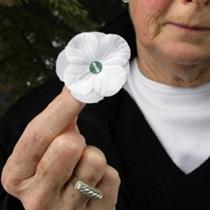 My colleague Jonathan Bartley will be on BBC Radio 4's Today programme tomorrow (around 06.50 a.m.), arguing the case for white as well as red poppies in remembering the war dead and victims of conflict. He is also being syndicated on IRN. In an article in tomorrow's Church Times, he writes: "The Christian tradition, and specifically the crucifix, have a great deal in common with the poppy. Both are linked to sacrifice. Both take a location of bloodshed and violence and make a statement about it. And both attempt to give us hope in the face of death. They imply that those who died did not do so in vain.
My colleague Jonathan Bartley will be on BBC Radio 4's Today programme tomorrow (around 06.50 a.m.), arguing the case for white as well as red poppies in remembering the war dead and victims of conflict. He is also being syndicated on IRN. In an article in tomorrow's Church Times, he writes: "The Christian tradition, and specifically the crucifix, have a great deal in common with the poppy. Both are linked to sacrifice. Both take a location of bloodshed and violence and make a statement about it. And both attempt to give us hope in the face of death. They imply that those who died did not do so in vain."But whilst apparently banned from wearing one symbol of hope (the cross), public figures in Britain are simultaneously urged, indeed in many cases, required, to wear another (the red poppy) – almost as an article of faith. There is a 'political correctness' about the red poppy, which often goes unnoticed.
"But there is a crucial difference between the red poppy and the crucifix. Whilst the red poppy implies redemption can come through war, the Christian story implies that redemption comes through nonviolent sacrifice. The white poppy is much more Christian, in that respect, than the red variety.
"The historical alignment of churches with Governments and the national interest has meant that churches have often giving their blessing to war. However as was seen over their widespread opposition to the invasion of Iraq, churches are increasingly willing to oppose military action, as churches become less aligned with both the state and British culture.
"Whether you are from a 'Just War', or a pacifist tradition, Christians believe that there is no redemption in war. Churches, who host so many services of remembrance, should at least give people the choice, and make white poppies more widely available, alongside red ones.
"The crucial question is not whether we should remember. The question is how we should remember. And how we answer this question affects not just the memory of those who died, but those who are still dying in wars around the world."

No comments:
Post a Comment